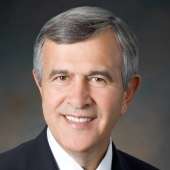Health care hot topic in Nebraska
Dear Nebraskans,
Last week, I traveled approximately 1,100 miles across Nebraska from Scottsbluff to South Sioux City, holding seven town halls, five round tables, and other meetings in 11 counties. I listened closely to Nebraskans' concerns and there is overwhelming anxiety about health care legislation.
To be clear, I do believe action is needed. Small businesses are struggling to provide health insurance for employees, and many Nebraskans are falling through the cracks. At the Chase County Fair, I heard from a woman whose husband is a trucker with no health care plan. He makes too much money to qualify for Medicaid, is not old enough for Medicare, but has a pre-existing condition so he can't qualify for health insurance. There are about 12 million people like this across the country, who do not qualify for government programs and have no affordable options. We must find a solution for these people that won't break the bank.
But current proposals are riddled with bad policy ideas. Expanding the government's role by forcing unfunded Medicaid mandates on the states and sacrificing crucial Medicare funding is very much the wrong approach. Establishing a government-run option that drives private companies out of business is another bad idea.
I visited critical access hospitals in Cherry and Brown Counties. These 25-bed hospitals provide essential services, but without a dense population base to help absorb escalating costs, they face serious challenges. Did you know there is only one hospital delivering babies between Chadron and O'Neill? It's in Valentine. We can't afford to lose it or any of our rural hospitals.
Unfortunately, the current reform proposals would put some doctors' offices and hospitals at risk, and therefore their patients. If doctors in New York retire rather than operate under government rates, there is little impact, but similar retirements in rural Nebraska could have a dramatic effect. Under a one-size-fits-all approach for both New York City and Nebraska City, our state loses.
I asked our rural hospitals if they could keep their doors open at the Medicare/Medicaid reimbursement rates the government provides. The doctors and hospital administrators said no. This means private insurance companies have to pay higher reimbursement rates to subsidize government programs. As Washington attempts to shift more and more people onto government-run insurance, our rural doctors and hospitals will struggle to stay open and serve our citizens. Health care reform must address this and protect critical access hospitals.
I am co-sponsoring legislation that would do just that. It's a rural hospital and provider equity act that adjusts Medicare rates for rural hospitals and doctors, among other provisions. There are other good ideas about how to bring costs under control and expand access without sacrificing quality care and consumer choice. I support them and I hope my colleagues will seriously consider them instead of ramming a bad bill through Congress.
I continue traveling the state this week, eager to hear more from you about health care and other important policies.
Sincerely,

